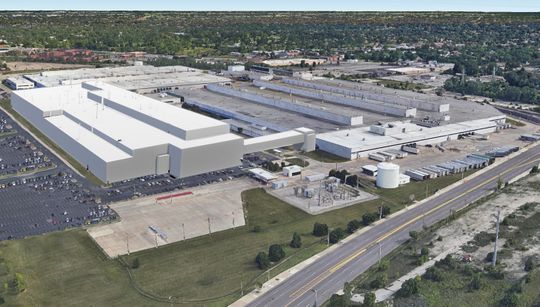
Lest anyone think Tuesday’s major Jeep announcement of a new assembly plant on Detroit’s east side sets up another Poletown controversy with widespread involuntary displacement of residents, it won’t.
In a major boost for Detroit’s economy, Fiat Chrysler Automobiles announced Tuesday with Mayor Mike Duggan and Gov. Gretchen Whitmer that it will create some 5,000 jobs and invest more than $1 billion to create a new Jeep final assembly plant at the site of its old Mack Avenue engine plant near St. Jean and Mack on Detroit’s east side.
And even though the City of Detroit must assemble 200 acres of land for the project, it no longer has the eminent domain power to boot residents out of their homes and demolish a neighborhood to build an auto plant, as it did for General Motors’ Hamtramck assembly plant in the 1980s, known as the Poletown controversy after the lost Polish district.
That sort of eminent domain seizure has been outlawed in Michigan for many years now. And besides, the politics of the day probably wouldn’t allow it to happen. So Tuesday’s announcement of the new Jeep plant on the east side drew cheers, not protests.
Instead, as Duggan told reporters, the city will have to persuade property owners in the area of St. Jean and Mack on the east side to sell voluntarily, or, in many cases, to swap their land for another parcel the city owns elsewhere. That process begins immediately and the city has 60 days under its deal with FCA to complete the land assembly.
It helps enormously that about 170 of the needed 200 acres are in the hands of a few large owners, including the city itself, DTE Energy and the Moroun family.
And don’t forget that the city’s new community benefits ordinance mandates that FCA, the company building the new plant as part of a total $4.5 billion manufacturing expansion in southeast Michigan that will mean nearly 6,500 jobs overall, will need to negotiate a basket of enhancements for the nearby neighborhoods.
That agreement could include job training, pollution controls or other improvements that will smooth the way for public acceptance of the project.
It’ll be interesting to see what happens if a few small owners decide to hold up the city asking exorbitant prices for tiny parcels. It’s hard to imagine the city won’t get the land it needs, but there could be a few snares along the way.
In the meantime, here are some of the other questions that arose from Tuesday’s announcement of the new Jeep plant:
Coleman A. Young International Airport, the former City Airport
Over the past year or so, Duggan and his team have suggested possibly closing the city’s east-side airport and converting its 260 acres to something new, perhaps an industrial park. Proponents of that idea point out that the airport is underused and that it’s difficult to assemble that much land if a major project comes along.
The new Jeep plant will no doubt lead to spin-off projects by suppliers or related businesses. Those projects will need land to build. Duggan said the city will fight to get new supplier plants that feed parts to the Jeep plant.
So this Jeep announcement could increase suggestions to close City Airport.
But it might also do just the opposite. The presence of the new Jeep plant a mile or so south of the airport could dramatically boost demand for air travel close to the plant. The next nearest airports to the Jeep plant site are perhaps a hour’s drive away.
How this will net out is anybody’s guess. But if nothing else, it’s likely that this Jeep announcement will step up the pressure for a decision to either revitalize City Airport with major new investment or to close it. It’s a debate that’s long overdue.
Jobs for Detroiters
They better, or at least a lot of them. There’s obviously no quota, but it’s to everyone’s gain to see that actual Detroiters benefit from so huge a project.
The good news is that that’s increasingly likely. The city’s workforce training programs have gotten stronger in recent years, and that will help supply qualified workers for some of the jobs. As Duggan pointed out, at the new Flex-N-Gate plant on Detroit’s east side, about 65 percent of the 800 employees live in the city.
Gov. Gretchen Whitmer labeled the deal a “generational investment” for the state and predicted spin-off benefits rippling through the state’s economy, with as many as eight spin-off jobs for each new job at the new Jeep plant. With average pay at the Jeep plant pegged at $58,000, this could produce an enormous payout for many Detroiters.
Property values
All those new workers will have to live somewhere, and while many may commute from farther away in the city or in the suburbs, at least some will choose to live close by, boosting demand in the immediate area. That could further propel the trend toward new construction that has already taken place closer to downtown and along the riverfront.
So there’s seems little doubt that the project will impact neighborhood property values on the east side, from the Jefferson-Chalmers neighborhood on the far lower east side to the Villages district to the west and other areas to the north.
Environmental impact
The big new development will mean an intensive industrial use of the site along with a major increase in vehicle traffic. By it’s nature that means a heavier burden on the immediate environment including the Conner Creek watershed feeding into the Detroit River.
Duggan acknowledged as much at his news conference Tuesday. But he said steps would be taken to minimize the impact on the water system.
























